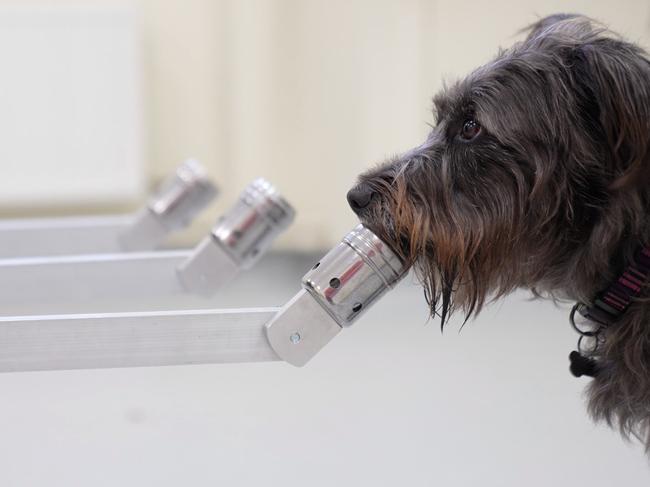Landmark study finds dogs can smell stress in humans with 93 per cent accuracy
A landmark new study has shed new light on the human-dog relationship and how dogs interpret a human’s feelings.

National
Don't miss out on the headlines from National. Followed categories will be added to My News.
This is one scientific study that passes the sniff test.
A dog’s nose knows, almost always, when its humans are experiencing stress, according to UK researchers.
A recent study from Queen’s University Belfast suggests dogs can smell the difference in breath and sweat from people who are suffering the negative emotion with an accuracy of 93.75 per cent.
“This study demonstrates that dogs can discriminate between the breath and sweat taken from humans before and after a stress-inducing task,” study author Clara Wilson from the unversity’s School of Psychology said.

“This finding tells us that an acute, negative, psychological stress response alters the odour profile of our breath/sweat, and that dogs are able to detect this change in odour,” Ms Wilson said.
To test the theory, researchers collected samples of breath and sweat from people both before and after a fast-paced, complex maths problem.
They collected heart rate, blood pressure, and self-reported stress level measurements in the study, published in the peer-reviewed journal PLOS ONE.
The breath and sweat samples from 36 participants who reported stress were presented to four trained dogs, of different and mixed breeds, within three hours of collection.
Our @QUBSnifferDogs have graduated with a #PhDog in Psychology.
— Queen's University Belfast 🎓 (@QUBelfast) December 16, 2021
Their research required them to sniff out the answer to whether dogs can smell stress. Here’s how: https://t.co/XgClFVbC1U#LoveQUB | #LoveQUBGrad | @QUBPsychpic.twitter.com/no0cqp9tus
They detected stress in 675 of 720 trials, or 93.75 per cent of the time on average. Individual dogs ranged in performance from 90 per cent to 96.88 per cent accuracy.
The four dogs were aged between 11 to 36 months and included a male cocker spaniel, a female cockapoo, and two undetermined mixed breed rescue dogs similar to a lurcher and a terrier.
Ms Wilson and her colleagues believe the dogs, with their remarkable sense of smell and co-evolution with humans, can detect odours that show a change in “Volatile Organic Compounds” produced in response to stress.

The results suggest how they’re able to support human psychological conditions such as anxiety, panic attacks and post-traumatic stress disorder (PTSD).
“Dogs were able to discriminate, with a high degree of accuracy, between human breath and sweat samples taken at baseline and when experiencing psychological stress,” the study says.
“Establishing that dogs can detect an odour associated with stress sheds light on the human-dog relationship and adds to our understanding of how dogs may interpret, and interact with, human psychological states.”
More Coverage
Originally published as Landmark study finds dogs can smell stress in humans with 93 per cent accuracy





